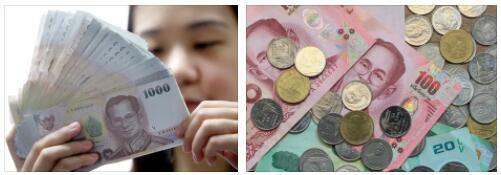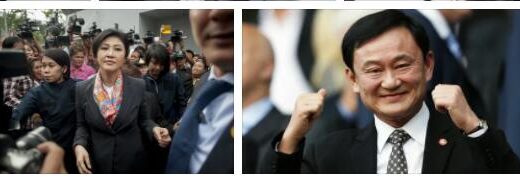Thailand Current Political Situation Part IV
Constitutional referendum without discussion
With a new constitution, the military wants to consolidate its power over the long term. A House of Lords dominated by the military and made up of appointed, unelected representatives, is given extensive powers. The Constitutional Court could remove governments if it detects a “political crisis”. Unelected bodies could exert considerable influence, both in screening out “morally” unsatisfactory candidates and in formulating political guidelines and national development plans. Social and political rights, such as the right to fair wages or the right to form a union, no longer appear in the constitution.
On August 7, 2017, the Thai citizens voted on this draft in a referendum. The result seems to mean that the majority of Thais agree. But critical comments about the draft were not allowed. Parties were not allowed to meet at all to discuss the referendum, and critical statements in public should not “stir up political conflict between Thais”. All of this in a climate of repression that is increasingly absurd accepts. The main means of doing this is the persecution of politically dissenters under the law against libel of majesty. The law is systematically used against critical voices, but it also hits more and more “normal” people who express themselves critically about the monarchy. The 63 year old Ampon Tangnoppakul was sentenced to 20 years imprisonment for a critical text message. A taxi driver was sued and convicted over a discussion with a passenger. A man who made fun of King Bhumibol’s dog on Facebook could face up to 15 years in prison. Politically prominent examples are Chiranuch Premchaiporn, the editor of the critical website Prachatai, who received 8 months probation for not deleting comments critical of the monarchy on the site quickly enough; Actors who appeared in a play “The Wolf’s Bride” and Sulak Sivaraksa, who is now on trial for the fifth time for lese majesty because he questioned whether a famous elephant battle actually took place in the 16th century.
Coup!
On May 22, 2014, the Thai military staged another coup. General Prayuth Chan-ocha and the other generals of the self-proclaimed National Council for Law and Order belong to the Eastern Tigers / Queens Guard faction known as Conservative Royalists. The coup was directed against the government of Yingluck Shinawatra, sister of the exiled Thaksin Shinawatra. The coup was officially approved by King Bhumibol after four days. The military junta has immediately a comprehensive media censorship introduced and hundreds of Thaksin-affiliated politicians and Rothemdaktivisten arrested. After interrogation, they were released on the condition that they would not undertake any activities against the new rulers. Many activists now face longer sentences for ” lese majesty.” Officially, the coup serves “national reconciliation.” With dance events, free tickets for the nationalist film “The Legend of King Naresuan” and a song composed by Prayuth, the people are ordained to be ” happy “. Despite martial law, a ban on assemblies and a curfew, there were public protests. The three-finger salute from the film “The Hunger Games” becomes a symbol of resistance.
In the meantime, the NPCO has appointed a national assembly, which consists of a majority of generals and which has elected a new transitional government – with Prayuth as prime minister. She wants to strengthen the monarchy and fight corruption – but is herself being accused of corruption. A National Reform Council appointed by the junta is supposed to draft a new constitution that will rule out the possibility of re-election of a party affiliated with Thaksin. With a reform of the school system, children should learn the “twelve Thai values”- including love for the nation and the king – are taught. The fact that a picture of Adolf Hitler was used to advertise these values caused a wave of indignation.
Protests of the “People’s Democratic Reform Committee”
After weeks of protests in November 2013, Prime Minister Yingluck Shinawatra dissolved parliament in December and announced new elections for February 2, 2014. The reason for the new round of protests was the passing of an amnesty law that annulled all crimes committed in connection with the political conflict of recent years. The law was supposed to contribute to the reconciliation of the country, but would also have overturned Thaksin’s convictions for corruption and taking advantage, thus enabling his return.
The possible return of Thaksin brought his opponents to the streets. The clashes are thus a new edition of the conflicts between red shirts and yellow shirts. The new movement is led by the “ Democratic Party ” politician, Suthep Thaugsuban, who was charged with murder for his responsibility for the bloody crackdown on the 2010 red shirt protests. His shrill tones against the “Thaksin regime” should signal that there can be no compromise. The dissolution of the government was not enough for him because the ruling Phüa Thai party would probably have won the next election. Instead, Suthep tried the idea of a “People’s Committee”to disseminate, which would be composed of appointed representatives of a class society. This revealed the anti-democratic goals of the protest movement and its affinity with the now discredited yellow shirts of the “People’s Alliance for Democracy” (PAD). Although the protesters tried to prevent the new elections by blocking the registration of candidates, the election took place in most of the districts on February 2, 2014. Although the Phüa Thai party won the vast majority of the vote, the election was a defeat for Yingluck Shinawatra. The low turnout of 45% not only testified to the size of the boycott, but also reflected the red shirts’ disappointment with the government. Then at the end of March the Constitutional Court canceled the election, a decision that paved the way for the coup. The same court also intervened to overturn the government’s multi-billion dollar infrastructure project (with high-speed trains, etc.) as “unconstitutional”. The prime minister also came under pressure from the anti-corruption agency, which she is responsible for sued corruption allegations in the travel program.



